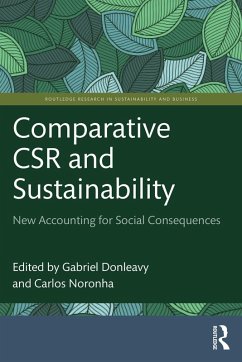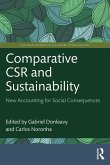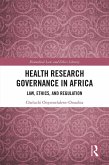Comparative CSR and Sustainability (eBook, PDF)
New Accounting for Social Consequences
Redaktion: Donleavy, Gabriel; Noronha, Carlos
48,95 €
48,95 €
inkl. MwSt.
Sofort per Download lieferbar

24 °P sammeln
48,95 €
Als Download kaufen

48,95 €
inkl. MwSt.
Sofort per Download lieferbar

24 °P sammeln
Jetzt verschenken
Alle Infos zum eBook verschenken
48,95 €
inkl. MwSt.
Sofort per Download lieferbar
Alle Infos zum eBook verschenken

24 °P sammeln
Comparative CSR and Sustainability (eBook, PDF)
New Accounting for Social Consequences
Redaktion: Donleavy, Gabriel; Noronha, Carlos
- Format: PDF
- Merkliste
- Auf die Merkliste
- Bewerten Bewerten
- Teilen
- Produkt teilen
- Produkterinnerung
- Produkterinnerung

Bitte loggen Sie sich zunächst in Ihr Kundenkonto ein oder registrieren Sie sich bei
bücher.de, um das eBook-Abo tolino select nutzen zu können.
Hier können Sie sich einloggen
Hier können Sie sich einloggen
Sie sind bereits eingeloggt. Klicken Sie auf 2. tolino select Abo, um fortzufahren.

Bitte loggen Sie sich zunächst in Ihr Kundenkonto ein oder registrieren Sie sich bei bücher.de, um das eBook-Abo tolino select nutzen zu können.
This book breaks new ground by providing a structured and cohesive set of contributions on the actions, developments, problems and theories of corporate social responsibility (CSR). A useful reference for those interested in discussions on crises, climate change, and SDGs and realizing sustainable goals through CSR.
- Geräte: PC
- ohne Kopierschutz
- eBook Hilfe
- Größe: 5.95MB
Andere Kunden interessierten sich auch für
![Comparative CSR and Sustainability (eBook, ePUB) Comparative CSR and Sustainability (eBook, ePUB)]() Comparative CSR and Sustainability (eBook, ePUB)48,95 €
Comparative CSR and Sustainability (eBook, ePUB)48,95 €![Understanding Chinese Corporate Governance (eBook, PDF) Understanding Chinese Corporate Governance (eBook, PDF)]() Lyndsey ZhangUnderstanding Chinese Corporate Governance (eBook, PDF)48,95 €
Lyndsey ZhangUnderstanding Chinese Corporate Governance (eBook, PDF)48,95 €![Perspectives in Sustainable Management Practices (eBook, PDF) Perspectives in Sustainable Management Practices (eBook, PDF)]() Perspectives in Sustainable Management Practices (eBook, PDF)42,95 €
Perspectives in Sustainable Management Practices (eBook, PDF)42,95 €![The Routledge Handbook of Integrated Reporting (eBook, PDF) The Routledge Handbook of Integrated Reporting (eBook, PDF)]() The Routledge Handbook of Integrated Reporting (eBook, PDF)46,95 €
The Routledge Handbook of Integrated Reporting (eBook, PDF)46,95 €![State-Owned Enterprise's Ownership Reform (eBook, PDF) State-Owned Enterprise's Ownership Reform (eBook, PDF)]() Zhigang ZhengState-Owned Enterprise's Ownership Reform (eBook, PDF)37,95 €
Zhigang ZhengState-Owned Enterprise's Ownership Reform (eBook, PDF)37,95 €![The Asian Economy (eBook, PDF) The Asian Economy (eBook, PDF)]() The Asian Economy (eBook, PDF)37,95 €
The Asian Economy (eBook, PDF)37,95 €![Health Research Governance in Africa (eBook, PDF) Health Research Governance in Africa (eBook, PDF)]() Cheluchi Onyemelukwe-OnuobiaHealth Research Governance in Africa (eBook, PDF)42,95 €
Cheluchi Onyemelukwe-OnuobiaHealth Research Governance in Africa (eBook, PDF)42,95 €-
-
-
This book breaks new ground by providing a structured and cohesive set of contributions on the actions, developments, problems and theories of corporate social responsibility (CSR). A useful reference for those interested in discussions on crises, climate change, and SDGs and realizing sustainable goals through CSR.
Dieser Download kann aus rechtlichen Gründen nur mit Rechnungsadresse in A, B, BG, CY, CZ, D, DK, EW, E, FIN, F, GR, HR, H, IRL, I, LT, L, LR, M, NL, PL, P, R, S, SLO, SK ausgeliefert werden.
Produktdetails
- Produktdetails
- Verlag: Taylor & Francis
- Seitenzahl: 422
- Erscheinungstermin: 30. Dezember 2022
- Englisch
- ISBN-13: 9781000820782
- Artikelnr.: 66415658
- Verlag: Taylor & Francis
- Seitenzahl: 422
- Erscheinungstermin: 30. Dezember 2022
- Englisch
- ISBN-13: 9781000820782
- Artikelnr.: 66415658
- Herstellerkennzeichnung Die Herstellerinformationen sind derzeit nicht verfügbar.
Gabriel Donleavy is a Professor of Accounting at the University of New England, Australia. Carlos Noronha is an Associate Professor of Accounting at the University of Macau, Macau SAR, China.
1. Introduction: CSR at the peak of the globalisation movement Part 1: CSR:
Extinction, disasters, and the new paradigm 2. The transition from
biodiversity to extinction accounting in the Chinese context 3. Responsive
approaches to community involvement in resettlement schemes to prevent
conflict: A case study in the Chibuto district, Mozambique 4.
Sustainability reporting during COVID-19: A study of the hospitality
industry 5. The reciprocal nature of CSR: A case study of Macau 6. The
impact of COVID-19 on social responsibility in stigmatized occupations
Part 2: CSR challenges in developing and least developed countries 7. The
role of NGOs in CSR: A comparison of NGOs' practices of and influences on
CSR in developing and developed countries 8. The process model of inclusive
innovation from an MNE perspective: A case study of India 9. CSR by
regulators: The case of sustainable villages for development (SV4D) in
Mozambique 10. Using "actor-network theory and friends" to explore CSR
reporting in the information and communication technology sector under the
Belt and Road Initiative Part 3: CSR: Greenwashing and window-dressing 11.
Corporate green initiatives as real circular economy or window-dressing?
12. Why are the Japanese companies publishing integrated reports?
Perceiving through the lens of institutional theory 13. Conceptualizing CSR
avoidance and engagement Part 4: CSR and new underlying assumptions 14. CSR
and the Orbital Theory of Accountability 15. Companies' responsibilities
and political dissent: The new frontier of corporate social responsibility?
16. Do businesses have a responsibility or an obligation to society?
Setting out the terms for business engagement 17. Managing stakeholder
relationships within corporate social responsibility communication Part 5:
Sustainability goals and ESG 18. The road towards an internationalized
Sustainable Development Goals Disclosure (SDGD) practice in China 19. The
general overview of Environmental, Social and Governance (ESG) guidelines
in Hong Kong: Past, present and future 20. Corporate social responsibility
and countries' reputation: A study from a global strategic management
perspective 21. Concluding remarks: Comparative CSR and sustainability
research - An axial analysis
Extinction, disasters, and the new paradigm 2. The transition from
biodiversity to extinction accounting in the Chinese context 3. Responsive
approaches to community involvement in resettlement schemes to prevent
conflict: A case study in the Chibuto district, Mozambique 4.
Sustainability reporting during COVID-19: A study of the hospitality
industry 5. The reciprocal nature of CSR: A case study of Macau 6. The
impact of COVID-19 on social responsibility in stigmatized occupations
Part 2: CSR challenges in developing and least developed countries 7. The
role of NGOs in CSR: A comparison of NGOs' practices of and influences on
CSR in developing and developed countries 8. The process model of inclusive
innovation from an MNE perspective: A case study of India 9. CSR by
regulators: The case of sustainable villages for development (SV4D) in
Mozambique 10. Using "actor-network theory and friends" to explore CSR
reporting in the information and communication technology sector under the
Belt and Road Initiative Part 3: CSR: Greenwashing and window-dressing 11.
Corporate green initiatives as real circular economy or window-dressing?
12. Why are the Japanese companies publishing integrated reports?
Perceiving through the lens of institutional theory 13. Conceptualizing CSR
avoidance and engagement Part 4: CSR and new underlying assumptions 14. CSR
and the Orbital Theory of Accountability 15. Companies' responsibilities
and political dissent: The new frontier of corporate social responsibility?
16. Do businesses have a responsibility or an obligation to society?
Setting out the terms for business engagement 17. Managing stakeholder
relationships within corporate social responsibility communication Part 5:
Sustainability goals and ESG 18. The road towards an internationalized
Sustainable Development Goals Disclosure (SDGD) practice in China 19. The
general overview of Environmental, Social and Governance (ESG) guidelines
in Hong Kong: Past, present and future 20. Corporate social responsibility
and countries' reputation: A study from a global strategic management
perspective 21. Concluding remarks: Comparative CSR and sustainability
research - An axial analysis
1. Introduction: CSR at the peak of the globalisation movement Part 1: CSR:
Extinction, disasters, and the new paradigm 2. The transition from
biodiversity to extinction accounting in the Chinese context 3. Responsive
approaches to community involvement in resettlement schemes to prevent
conflict: A case study in the Chibuto district, Mozambique 4.
Sustainability reporting during COVID-19: A study of the hospitality
industry 5. The reciprocal nature of CSR: A case study of Macau 6. The
impact of COVID-19 on social responsibility in stigmatized occupations
Part 2: CSR challenges in developing and least developed countries 7. The
role of NGOs in CSR: A comparison of NGOs' practices of and influences on
CSR in developing and developed countries 8. The process model of inclusive
innovation from an MNE perspective: A case study of India 9. CSR by
regulators: The case of sustainable villages for development (SV4D) in
Mozambique 10. Using "actor-network theory and friends" to explore CSR
reporting in the information and communication technology sector under the
Belt and Road Initiative Part 3: CSR: Greenwashing and window-dressing 11.
Corporate green initiatives as real circular economy or window-dressing?
12. Why are the Japanese companies publishing integrated reports?
Perceiving through the lens of institutional theory 13. Conceptualizing CSR
avoidance and engagement Part 4: CSR and new underlying assumptions 14. CSR
and the Orbital Theory of Accountability 15. Companies' responsibilities
and political dissent: The new frontier of corporate social responsibility?
16. Do businesses have a responsibility or an obligation to society?
Setting out the terms for business engagement 17. Managing stakeholder
relationships within corporate social responsibility communication Part 5:
Sustainability goals and ESG 18. The road towards an internationalized
Sustainable Development Goals Disclosure (SDGD) practice in China 19. The
general overview of Environmental, Social and Governance (ESG) guidelines
in Hong Kong: Past, present and future 20. Corporate social responsibility
and countries' reputation: A study from a global strategic management
perspective 21. Concluding remarks: Comparative CSR and sustainability
research - An axial analysis
Extinction, disasters, and the new paradigm 2. The transition from
biodiversity to extinction accounting in the Chinese context 3. Responsive
approaches to community involvement in resettlement schemes to prevent
conflict: A case study in the Chibuto district, Mozambique 4.
Sustainability reporting during COVID-19: A study of the hospitality
industry 5. The reciprocal nature of CSR: A case study of Macau 6. The
impact of COVID-19 on social responsibility in stigmatized occupations
Part 2: CSR challenges in developing and least developed countries 7. The
role of NGOs in CSR: A comparison of NGOs' practices of and influences on
CSR in developing and developed countries 8. The process model of inclusive
innovation from an MNE perspective: A case study of India 9. CSR by
regulators: The case of sustainable villages for development (SV4D) in
Mozambique 10. Using "actor-network theory and friends" to explore CSR
reporting in the information and communication technology sector under the
Belt and Road Initiative Part 3: CSR: Greenwashing and window-dressing 11.
Corporate green initiatives as real circular economy or window-dressing?
12. Why are the Japanese companies publishing integrated reports?
Perceiving through the lens of institutional theory 13. Conceptualizing CSR
avoidance and engagement Part 4: CSR and new underlying assumptions 14. CSR
and the Orbital Theory of Accountability 15. Companies' responsibilities
and political dissent: The new frontier of corporate social responsibility?
16. Do businesses have a responsibility or an obligation to society?
Setting out the terms for business engagement 17. Managing stakeholder
relationships within corporate social responsibility communication Part 5:
Sustainability goals and ESG 18. The road towards an internationalized
Sustainable Development Goals Disclosure (SDGD) practice in China 19. The
general overview of Environmental, Social and Governance (ESG) guidelines
in Hong Kong: Past, present and future 20. Corporate social responsibility
and countries' reputation: A study from a global strategic management
perspective 21. Concluding remarks: Comparative CSR and sustainability
research - An axial analysis







